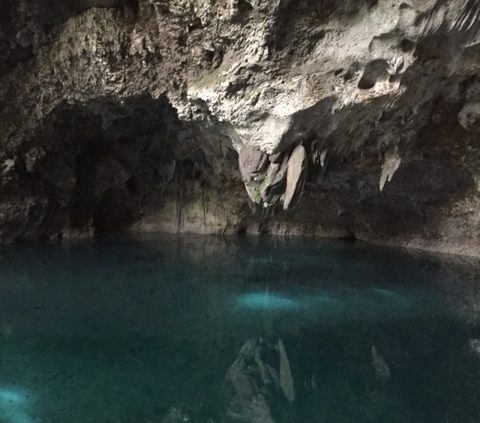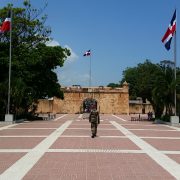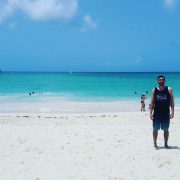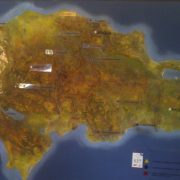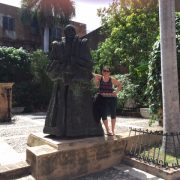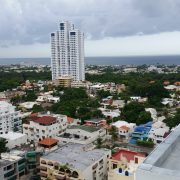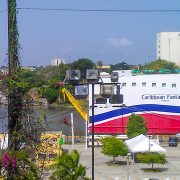The Highs and Lows of Fieldwork
By Elsie Silva MSW ’16
It is surreal to think that I am now past the half way point of my stay here in the Dominican Republic. This trip has been filled with new experiences and lessons that I never thought I would take part in. After the first week of setting up the logistical components of the study we have been working on with MSM (men who have sex with men) sex workers, the team and I had to be trained on how to conduct interviews and administer HIV tests to the participants. During the second week, we focused our efforts on making sure everyone was trained properly and the survey questions were translated correctly. During the second week, I began to feel nervous about actually interviewing the participants. Although I had already interviewed some participants during the first week, Dr. Holloway was there if we had any questions or concerns. Since Dr. Holloway had to return to the U.S. after the first week, the next 5 weeks of interviewing would be by ourselves. I knew how to interview and work with participants since my background is in Social Work and my first year placement was at a hospital, where Bio-Psycho-Social Assessments had to be conducted with every new patient. However, I was interviewing a population I had never worked with and now had to work through cultural differences and norms. The Spanish spoken in the DR was also a bit different compared to the Spanish I grew up hearing and speaking. That is still something I have trouble with, especially since some of the words have different meanings in the Dominican Republic and Mexico (where I grew up).
Once we began interviewing in the third week, I started to feel more confident and relaxed with every new participant. The surveys were being completed with greater ease, and administering the HIV test was no longer something that made me feel nervous. Then my first HIV+ participant happened and I was mortified. Having to tell someone such a life altering diagnosis is overwhelming to say the least. I used all of my clinical skills to try and alleviate some of the shock and concern of the participant. I was able to refer him to a clinic where a confirmatory test would be administered and treatment offered if in fact he was HIV+. I was at a loss for words when I finished with that participant and once I was able to compose myself, I began to interview the next participant who also came out HIV+. I could not believe I had two HIV+ participants in a row but no matter how horrible it was to have to give someone that news, I could not even begin to imagine what it must be like to be the one receiving that news. It took me a couple of days to feel at ease about the whole thing but I still think about those two participants and wonder how they are doing. While the first participant who came out positive was sent directly to the lab for a confirmatory test, the second participant had to return the next day since the lab was closed by the time I gave him the results. I tried calling him a week later to see how he was doing but the number he left with us was incorrect, which is not uncommon with the people we interview. I just hope both participants were able to take a confirmatory test and were given the proper information and guidance.
While conducting this study has been challenging at times, I have been able to keep exploring the Dominican Republic during the weekends and immersing myself in its culture. During the second weekend, we were able to see one of the most beautiful waterfalls in Constanza called Salto de las Aguas Blancas During the third weekend, we went to Los Tres Ojos, which are three caves with three separate lagoons inside one of Santo Domingo’s parks. Last weekend, we took a bus to the other side of the Dominican Republic to a city called Punta Cana. The white sandy beach and clear waters helped us to reenergize and continue our work the following Monday. It’s undeniable that the Dominican Republic has gorgeous spots that make this country a prime tourist destination. However, with the rise of tourism to this country also comes a rise in sex tourism. Most of the participants have mentioned that their clients are tourists who are coming from the United States or parts of Europe. More and more people are beginning to view the Dominican Republic as a sex destination. Since the Dominican Republic is a third world country, many people turn to sex work as their main source of income. This has caused a number of issues with how this country is being perceived and how sex workers are dealing with their decision to take part in the work they do. It is evident with the participants we have interviewed that most are sex workers due to financial issues. Most have to hide their work from family and friends, which can cause emotional and psychological damage to the individual. The topic of sex work is always a controversial one but I still feel there should be a discussion on how sex tourism is affecting this country and what can be done to help those who turn to sex work as their only way to survive.

